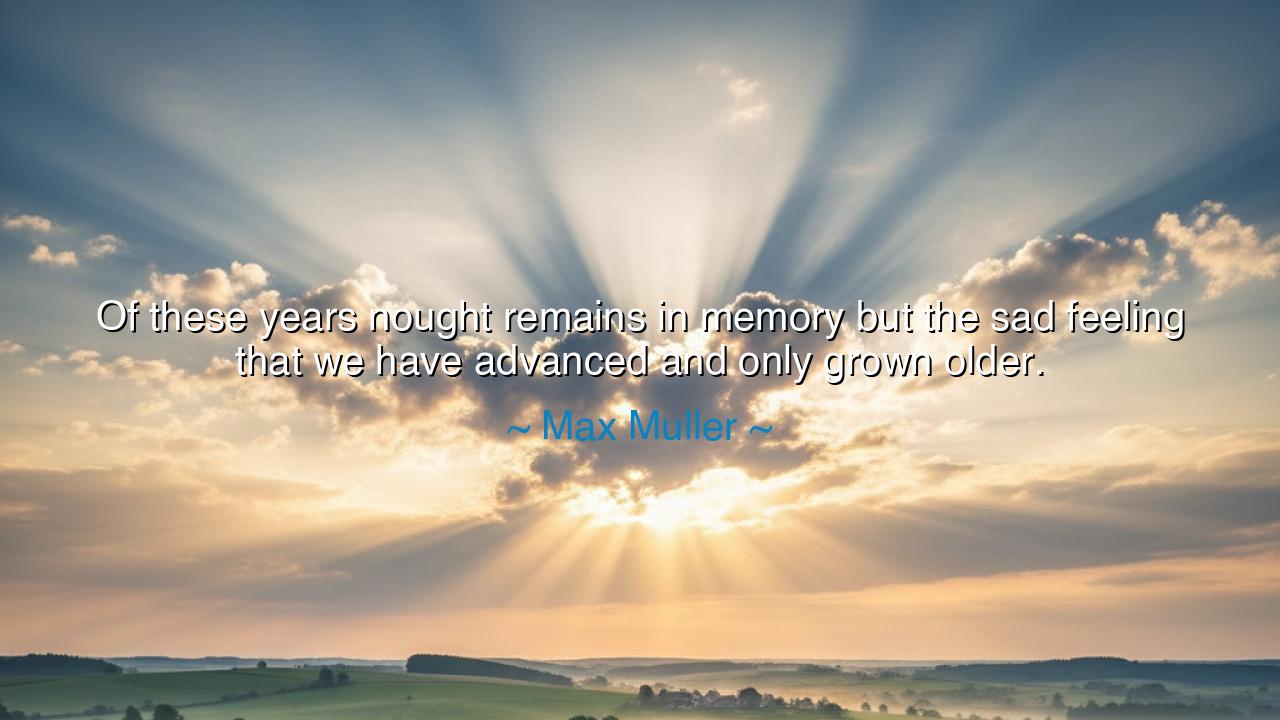
Of these years nought remains in memory but the sad feeling that
Of these years nought remains in memory but the sad feeling that we have advanced and only grown older.






“Of these years nought remains in memory but the sad feeling that we have advanced and only grown older.” — thus spoke Max Müller, scholar of tongues and seeker of truth. In these words lies the lament of every mortal who has looked back upon the passing of time and found its harvest thin. They are not the words of bitterness, but of recognition: that the years march on, and if we are not vigilant, they leave us with age but not with meaning.
The weight of this sad reflection is the contrast between advancement in years and advancement in soul. To grow older is inevitable, but to grow wiser, nobler, kinder—this is not guaranteed. Müller’s confession is the echo of an ancient truth: time alone does not bestow greatness. The memory of years may be barren if we have not filled them with deeds, friendships, and truths that outlive the body.
Consider the tale of Emperor Hadrian, ruler of Rome, who built walls and monuments that stretched across nations. In his old age, he composed a small poem to his own soul, addressing it as a “little guest” preparing to leave its dwelling. Despite all his conquests, he too felt the weight of passing years, the recognition that time strips away glory and leaves only the essence of one’s spirit. Like Müller, Hadrian understood that one may look back and find little but the sad reminder of age itself.
Yet this sorrow is not without purpose. It is a warning to us, a call to live differently. If Müller felt that memory held little but regret, then his words become for us a torch: do not let your years pass unmarked. Do not merely grow older—grow deeper. Let each year carry with it not just the dust of days, but the fruit of love, creation, and wisdom. For when the end comes, the wealth of life is not counted in years but in meaning.
This teaching strikes the heart because it reveals the danger of sleepwalking through existence. Many live as though life were an endless rehearsal, waiting for a moment when it will truly begin. But the years, patient and relentless, move forward, until one day we wake and realize that what we awaited has already slipped away. The sad truth Müller spoke can be avoided only if we claim each day as our own battlefield and each moment as our own chance to live fully.
The lesson is clear: let your memory be filled not with emptiness, but with the richness of purpose. Do not wait for some future season to pursue what you love, to speak the words you have withheld, to build the life you dream of. Every sunrise is a summons. Every step forward can be more than age—it can be growth. Let the years mark you not only with wrinkles of skin, but with engravings of the soul.
Practical action must follow: keep a record of your days, not in numbers but in meaning. Ask yourself each evening: what have I done today that gives weight to my existence? Seek to weave into your life acts of kindness, labors of creation, and moments of presence. Let your memory become a garden, not a desert, so that when you look back you will find not emptiness, but blossoms of joy and truth.
Thus Müller’s lament becomes our guide. To grow older is certain; to grow sad is optional. If we live with intention, then our years will not pass into shadows but into light. Let us walk with vigilance, filling our days with meaning, so that when we stand at the threshold of eternity, we may look back not with regret, but with gratitude. For the true measure of life is not how long we lived, but how deeply.






AAdministratorAdministrator
Welcome, honored guests. Please leave a comment, we will respond soon